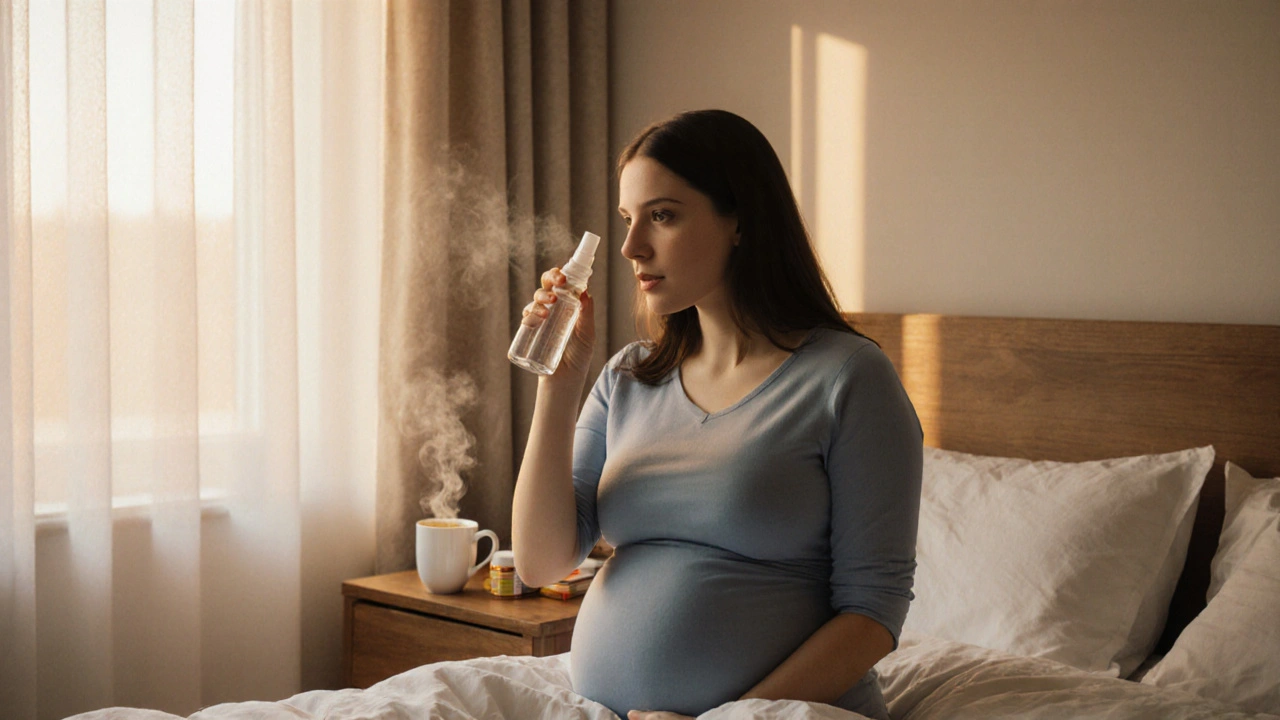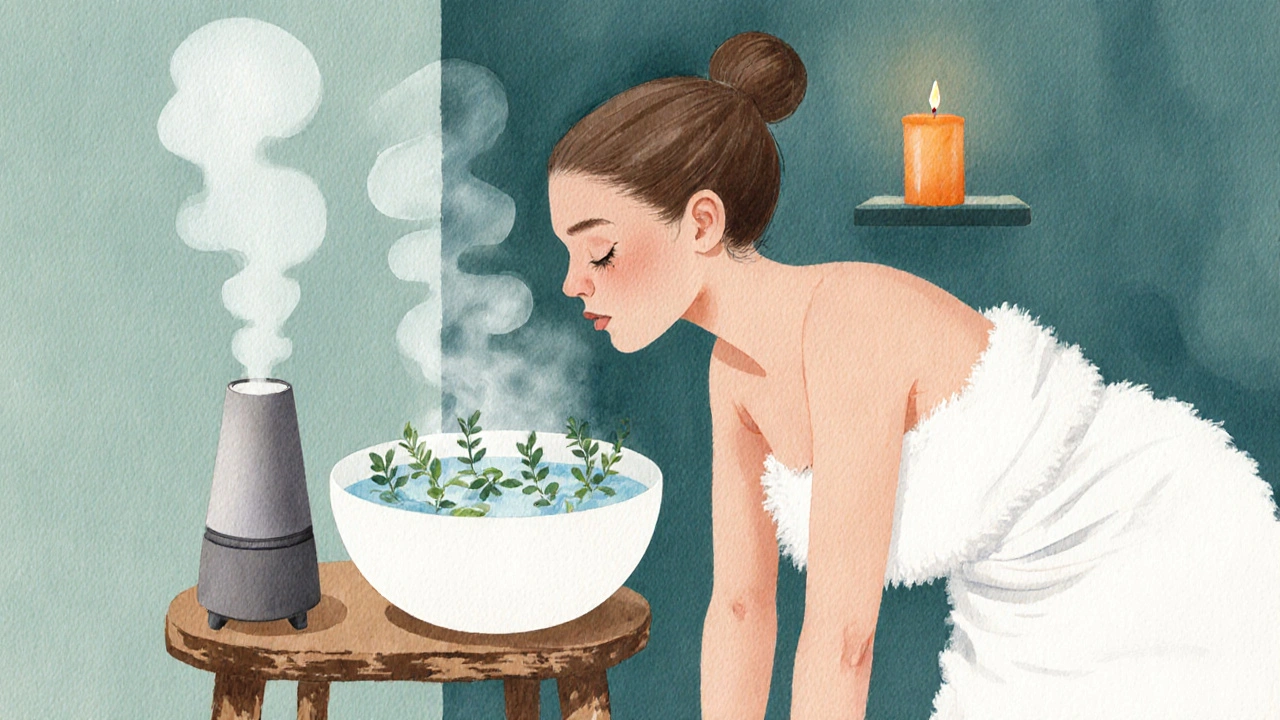
Pregnancy Medication Safety Checker
Enter a medication name and click "Check Safety" to see if it's safe during pregnancy.
Dealing with a runny nose while you’re pregnant can feel like an extra hurdle in an already busy time. Hormonal shifts, a boosted blood volume, and a slightly lowered immune response make you more prone to nasal irritation. The good news? Most of the time you can clear up the drip without risking your baby. Below are the safest, science‑backed steps to get relief fast.
Quick Takeaways
- Stick to saline sprays, steam, and humidifiers-no over‑the‑counter decongestants unless a doctor says otherwise.
- Stay hydrated and use warm fluids like ginger tea to thin mucus.
- Vitamin C and zinc can boost immunity without harming the fetus.
- Watch for red‑flag symptoms (fever, facial pain, lasting >10days) and call your provider.
- Prevent triggers by keeping your environment dust‑free and avoiding strong scents.
What Causes a Runny Nose in Pregnancy?
Runny nose is the excess production of thin, watery mucus that drips from the nostrils during pregnancy for several reasons:
- Elevated estrogen and progesterone increase blood flow to nasal passages, leading to swelling and more mucus.
- Pregnancy‑induced rhinitis (sometimes called "pregnancy rhinitis") can start as early as the first trimester.
- Common colds, allergies, or changes in indoor air quality add to the load.

Safe Home Remedies You Can Trust
When you’re expecting, the safest first line of defense is non‑medication methods. These tools work by loosening mucus, soothing irritated tissue, or keeping the air moist.
-
Saline nasal spray is a sterile salt‑water solution that rinses and moisturizes the nasal lining. Use 2-3 sprays in each nostril several times a day; it’s pregnancy‑approved and instantly clears the drip.
-
Steam inhalation involves breathing warm vapor to loosen thick mucus. Fill a bowl with hot water, drape a towel over your head, and inhale for 5‑10 minutes. Add a few drops of eucalyptus oil only if you’re not sensitive to strong scents.
-
Humidifier adds moisture to indoor air, easing nasal passage irritation. Keep the humidity between 40‑60% to prevent mold growth.
-
Warm fluids like ginger tea offers anti‑inflammatory benefits and helps thin mucus. A cup 2‑3 times daily can be soothing.
-
Honey‑lemon water (1tbsp honey + juice of half a lemon in warm water) coats the throat and reduces post‑nasal drip.
-
Vitamin C (500mg/day) and zinc (15‑30mg/day) are safe supplements that support immune function.
Medication: What’s Safe, What’s Not
If home tricks aren’t enough, a doctor may prescribe medication. Below is a quick guide to the most common options and their safety profile.
| Medication / Remedy | Pregnancy Category | Typical Use | Safety Verdict |
|---|---|---|---|
| Saline nasal spray | Not applicable | Moisturizing, mucus thinning | Safe |
| Antihistamines (e.g., loratadine) | Category B | Allergy‑related runny nose | Generally safe, use lowest effective dose |
| Decongestants (pseudoephedrine) | Category C | Severe nasal congestion | Use only if doctor approves; may affect fetal blood flow |
| Acetaminophen | Category B | Fever or pain accompanying cold | Safe within recommended limits (≤3g/day) |
| Ibuprofen | Category C/D | Pain/fever relief | Avoid after 20weeks gestation |
Key take‑away: Stick with saline spray, antihistamines like loratadine, and acetaminophen if you need pain relief. Anything else should be doctor‑approved.
Red‑Flag Signs: When to Call Your Healthcare Provider
The majority of runny noses are harmless, but certain symptoms signal a deeper issue:
- Fever higher than 100.4°F (38°C) lasting more than 24hours.
- Severe facial pain or pressure lasting >48hours.
- Green or yellow mucus accompanied by thick cough - could be a sinus infection.
- Persistent symptoms beyond 10days despite home care.
- Any shortness of breath, wheezing, or chest tightness.
If any of these appear, book an appointment. Early treatment can prevent complications and keep both you and the baby comfortable.

Prevention: Keeping the Runny Nose at Bay
Proactive steps can reduce how often you’re dealt a drip:
- Keep windows closed during high pollen seasons; use HEPA filters.
- Wash hands frequently to avoid viral spread.
- Stay well‑hydrated - aim for 2-3L of water a day.
- Elevate your head with an extra pillow while sleeping to encourage drainage.
- Avoid strong fragrances, smoke, and chemical cleaners that irritate nasal lining.
Putting It All Together: A Day‑by‑Day Plan
- Morning: Rinse with saline spray, sip warm ginger‑lemon tea, and run a humidifier for 30minutes.
- Mid‑day: If congestion returns, repeat a short steam session; take a prenatal‑safe vitamin C supplement.
- Evening: Use a second saline rinse, enjoy honey‑lemon water, and keep the bedroom humidity steady.
- Before Bed: Elevate your head, do a final saline spray, and ensure the humidifier is on low.
Follow this routine and you’ll notice less drip, better sleep, and a calmer pregnancy.
Frequently Asked Questions
Can I use over‑the‑counter cold medicine while pregnant?
Most OTC combos contain decongestants or NSAIDs that aren’t recommended without a doctor’s ok. Stick to saline spray, antihistamines like loratadine, and acetaminophen if you need pain relief.
Is it safe to take vitamin C supplements during pregnancy?
Yes. The recommended daily allowance for pregnant adults is 85mg, but a supplement up to 500mg is considered safe and can help your immune system.
How often can I use a humidifier?
You can run it continuously as long as you keep the water fresh and clean the unit weekly to prevent mold.
Do I need to tell my OB‑GYN about a runny nose?
Mention it during routine visits, especially if symptoms linger or you develop fever. Your provider can rule out infections that need prescription care.
Are there any foods that worsen a runny nose?
Spicy foods can temporarily increase mucus flow, which some find uncomfortable. Dairy isn’t proven to thicken mucus, but if you notice more congestion after milk, reduce intake.
Write a comment
Your email address will not be published.





15 Comments
I totally get how frustrating a drip can be when you’re already juggling prenatal appointments. Saline spray is really the safest bet and you can use it several times a day without worry. Keeping a humidifier on at night helped my husband’s allergies, so it’s worth a try for you too.
According to the article, loratadine falls under Category B and is generally considered safe when taken at the lowest effective dose.
First of all let me state that the whole runny nose issue is a trivial problem that pregnant women can solve with simple common sense The hormonal changes increase blood flow to the nasal lining and that is why the mucus runs like a faucet It is not some exotic condition that requires exotic drugs The best solution is saline nasal spray because it is just salt water and it does not cross the placenta The spray can be used multiple times a day without any side effects The article also mentions steam inhalation which is basically just hot water vapour and that is something any household can do The humidifier adds moisture to the air and keeps the nasal passages from drying out The author suggests ginger tea which has anti‑inflammatory properties and that is scientifically backed The recommendation of vitamin C and zinc is also valid because those nutrients support immune function The only thing I disagree with is the casual mention of pseudoephedrine as a last resort It is a Category C drug and should be avoided unless a doctor explicitly approves it The article does a decent job of listing safe medications but it could be clearer on the risks of ibuprofen after the second trimester The safety of acetaminophen within limits is well established and it is a good choice for fever The advice to stay hydrated is universal and applies to any illness The suggestion to elevate the head while sleeping is a simple trick that can improve drainage Finally remember that if the runny nose persists for more than ten days or is accompanied by fever you should see your OB‑GYN as the article rightly points out
I appreciate the thoroughness of the guide especially the clear table that separates safe from questionable treatments. Using a humidifier at night kept my sinuses from feeling clogged and the salt spray was a game‑changer.
Indeed the structured approach mirrors professional medical advice and adds a reassuring tone for expectant mothers seeking quick relief without compromising safety.
Just use salt spray and stop reading all the junk.
The philosophical angle of accepting natural bodily changes while taking responsible steps is a reminder that we must balance modern medicine with ancient wisdom.
Different cultures have traditional steam inhalations that are safe during pregnancy, so incorporating those practices can complement the recommendations.
Honestly, the article reads like a product brochure, but the practical tips are solid – just don’t expect a miracle cure, stay hydrated and the drip will eventually calm down.
Your sarcasm is noted, but the underlying science behind humidifiers and saline rinses is sound, and sharing that with a community helps demystify pregnancy cold care.
While the medical facts are correct, one must also consider the ethical responsibility of not normalizing discomfort; we should empower mothers to seek professional guidance rather than rely solely on home hacks.
In my experience the straightforward advice about avoiding ibuprofen after the second trimester is particularly important, as many overlook the timing nuances.
Wow, another list of do‑nothing remedies.
Even simple measures like saline spray can make a noticeable difference, especially when more aggressive drugs are contraindicated.
Although the article maintains a formal structure, it conspicuously omits discussion of alternative therapies that some practitioners deem beneficial, thereby presenting an incomplete picture.